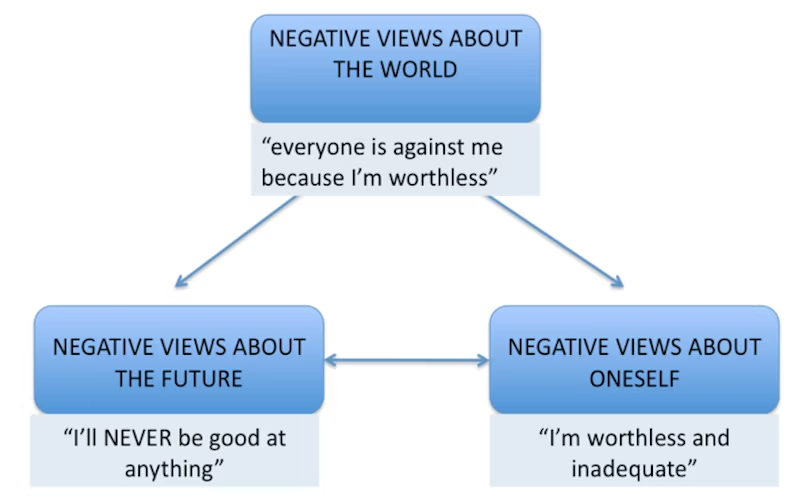cognitive approach to explaining depression
1/12
There's no tags or description
Looks like no tags are added yet.
Name | Mastery | Learn | Test | Matching | Spaced |
|---|
No study sessions yet.
13 Terms
name the 2 key cognitive theories that attempt to explain depression:
Beck’s Cognitive Triad
Ellis’ Irrational Thinking ABC Model
what is a -ve self schema?
interpreting info about oneself in a -ve way
often leads to cognitive bias
what is a cognitive bias?
focusing on the -ve aspects of the situation and ignoring the +ves
according to Beck, what maintains the -ve triad?
-ve self schemas
cognitive biases
give the 3 components of Beck’s -ve Triad:
-ve views about self
-ve views about future
-ve views about world

give 3 strengths of Beck’s -ve Triad:
Grazioli and Terry (2000) - 65 pregnant women assessed for cognitive vulnerability and depression before/after birth → those high in cognitive vulnerability more likely to suffer post natal depression ∴ Beck may be right about cognition causing depression
RWA of CBT - components of -ve Triad can be easily identified and challenged in CBT, enabling patients to test whether or not elements are true
Boury et al. (2001) - patients w/ depression more likely to show signs of cognitive bias (misinterpret info -vely) and -ve Triad (feel hopeless about future)
give a limitation of Beck’s -ve Triad:
(also for Ellis) does not explain all aspects of depression e.g. extreme anger/hallucinations/bizarre beliefs/Cotard syndrome - belief that they are a zombie: Jarrett (2013)
describe Ellis’ ABC Model:
Activating event - irrational thoughts triggered by external events
Belief - interpretation of an event: rational (healthy)/irrational (unhealthy) beliefs
Consequence of the event - can be emotional or behavioural
what did Ellis believe irrational beliefs were caused by? what does this mean?
mustabatory thinking - the belief that certain ideas must be true in order to be happy
wwhich 3 irrational beliefs did Ellis identify as most important?
I must be approved by people I think are important
I must do well or I am worthless
the world must give me happiness or I will die
give 2 strengths of Ellis’ ABC model:
application to REBT allows depressed person to take responsibility so that they can achieve resilience and feel better
RWA of CBT reinforced by Lipsky et al. (1980) who found that challenging irrational -ve beliefs can reduce depression
give 2 limitations of Ellis’ ABC model:
only explains reactive depression - cannot explain depression that arises w/o an obvious cause
application to REBT may be unethical and cause victim blaming due to the location of responsibility in the ABC model
(also for Beck) alternative explanations e.g. biological - genes/neurotransmitters/attachment style. reinforced by diathesis stress model and successful drug therapy
what does the diathesis stress model state?
individuals w/ a genetic vulnerability for depression are more prone to the effects of living in a -ve environment, which leads to -ve irrational thinking